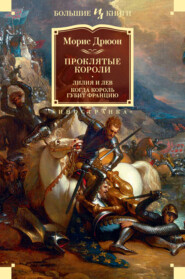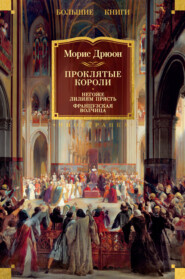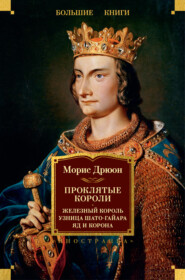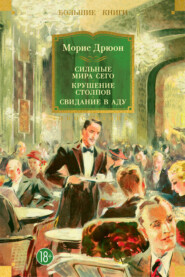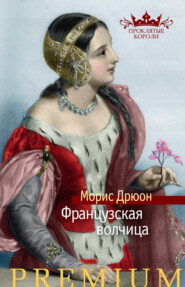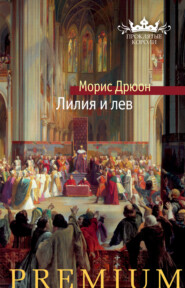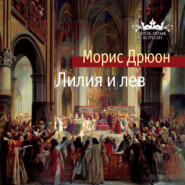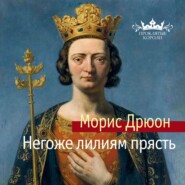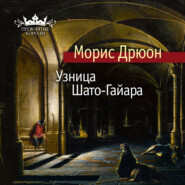По всем вопросам обращайтесь на: info@litportal.ru
(©) 2003-2025.
✖
The Lily and the Lion
Автор
Год написания книги
2019
Настройки чтения
Размер шрифта
Высота строк
Поля
Master Pierre Tesson and the Chevalier de Villebresme exchanged a glance. They were bored. The old Count de Bouville was not an easy witness, for his mind wandered constantly off the point. Yet he was far too old and far too distinguished for one to be sharp with him. Tesson went on:
‘“… and he declared to us in person that which is recorded below, in particular: that when he was Chamberlain to our Sire Philip IV, before the latter became King, he had knowledge of the marriage contract between the late Monseigneur Philippe of Artois and Madame Blanche of Brittany, and that he had the said contract in his hands, and that the said contract declared in precise terms that the County of Artois would devolve by right of inheritance to the said Monseigneur Philippe of Artois and, after him, to his heirs male, the issue of the said marriage …”’
Bouville waved a hand.
‘I did not assert that. I had the contract in my hands, as I have told you, and as I told Monseigneur Robert of Artois himself, when he came to visit me the other day, but in all conscience I have no memory of having read it.’
‘But why, Monseigneur, would you have had the contract in your hands if it was not to read it?’ asked the Chevalier de Villebresme.
‘To take it to my master’s chancellor for sealing; and I very well remember that the contract was sealed by all the peers, of which my master Philip the Fair was one, in his capacity as heir to the throne.’
‘This must be recorded, Tesson,’ said Villebresme: ‘all the peers applied their seals. Though you did not actually read the document, Monseigneur, you were nevertheless aware that the inheritance of Artois was assured to Count Philippe and his heirs male?’
‘I have heard it said,’ replied Bouville, ‘but I cannot go further than that.’
The way young Villebresme was trying to make him say more than he knew rather irritated him. Why, the fellow hadn’t even been born, nor, if it came to that, had his father even thought of begetting him, when the facts he was inquiring into had occurred. These junior Crown officials were all over-zealous in their new duties. But one of these days they too would be old and lonely, and sitting by an espalier in their garden. Yes, Bouville remembered the terms of Philippe of Artois’ marriage contract. But when had he first heard them spoken about? Was it at the time of the marriage itself, in ’82, or when Count Philippe died, in ’98, from wounds received in the Battle of Furnes? Or, again, was it after old Count Robert II had been killed at the Battle of Courtrai, in 1302, having survived his son by four years, which fact had given rise to the lawsuit between his daughter Mahaut and his grandson the present Robert III?
Bouville was being asked to give a precise date to a memory which might well relate to almost any time in a period of over twenty years. And it was not only Tesson and this Chevalier de Villebresme who had come to pick his brains, but Monseigneur Robert of Artois himself, courteously and respectfully, it must be admitted, but nevertheless talking loud and walking restlessly up and down the garden, crushing the flowers beneath his boots!
‘Very well, we will make the necessary correction,’ said the notary, turning to his manuscript: ‘“… and that he had the said contract in his hands, but only for a short while, and remembers also that it was sealed with the seals of all the peers; and the Count de Bouville has also declared to us that he heard tell at that time that the said contract stated in precise terms that the County of Artois …”’
Bouville nodded agreement. He would have preferred that ‘at that time’ be suppressed; the phrase ‘heard tell at that time …’ had been introduced by the notary into his evidence. But he was tired of struggling. And did one little phrase matter all that much?
‘“… would devolve to his heirs male of the said marriage; and he has also certified that the contract was placed in the archives of the Court, and also believes it certain that it was later subtracted from the said archives by wicked contrivance on the orders of Madame Mahaut of Artois …”’
‘I didn’t say that either,’ Bouville remarked.
‘You didn’t say it in that form, Monseigneur,’ replied Villebresme, ‘but it emerges from your deposition. Let us go back to what you do certify. In the first place, the marriage contract existed. Secondly, you saw it. Thirdly, it was placed in the archives …’
‘Sealed with the seals of the twelve peers …’
Villebresme exchanged a weary glance with the notary.
‘Sealed with the seals of the peers,’ he repeated to conciliate the witness. ‘You also certify that the contract excluded the Countess Mahaut from the inheritance, and that it disappeared from the archives, so that it cannot be produced at the lawsuit Monseigneur Robert of Artois is bringing against his aunt. Who do you think subtracted it? Do you think King Philip the Fair gave the order?’
It was a cunning question; for it had often been whispered that Philip the Fair had given a partial judgement in favour of the mother-in-law of his two youngest sons. People would be pretending next that it was Bouville himself who had been ordered to see that the documents disappeared!
‘Messire, do not associate the memory of my master King Philip the Fair with so villainous a deed,’ he replied with dignity.
The bells of Saint-Germain-des-Prés rang out above the roofs and the trees. It occurred to Bouville that it was the hour at which he was brought a bowl of curds; his doctor had advised him to take them three times a day.
‘In that case,’ went on Villebresme, ‘it is clear that the contract was subtracted without the King’s knowledge. And who could have any interest in doing that except the Countess Mahaut?’
The young commissioner tapped the stone bench with the tips of his fingers; he was rather pleased with his argument.
‘Oh, of course,’ said Bouville, ‘Mahaut is capable of anything.’
Bouville required no convincing on that point. He knew Mahaut to be guilty of two crimes which were far more serious than the mere stealing of documents. She had undoubtedly killed King Louis X; and, under his very eyes, she had killed a five-day-old child whom she believed to be the little posthumous King – and she had done these things in order to retain her County of Artois. It seemed almost silly to be so scrupulous about one’s evidence if it were going to benefit her. She had most certainly stolen her brother’s marriage contract, which she now had the face to deny on oath had ever existed. What a horrible woman she was! Because of her, the true heir of the Kings of France was growing up in a little Italian town far from his own realm, in the house of a Lombard merchant, who believed him to be his son. But one must not think of that. Bouville had once confessed the secret, which he alone knew, to the Pope. But he must never think of it now, for it might lead him into indiscretion. Oh, if only these officials would go away!
‘You’re quite right, let what you have written stand,’ he said in a rather quavering voice. ‘Do I have to sign?’
The notary handed Bouville the pen. But Bouville could scarcely see the edge of the paper. His signature overran the document. They heard him murmur: ‘God will certainly see to it that she expiates her sins before he hands her over to the Devil’s care.’
The notary sanded his signature and put the paper and writing-board into his black leather bag; then the two officials rose to take their leave. Bouville saluted them with his hand, without rising. By the time they were ten paces off they had become no more than vague shadows dissolving behind a wall of water.
The old Chamberlain rang a little handbell beside him to ask for his curds. His thoughts were disturbing. How could his venerated master, King Philip the Fair, have given judgement about Artois and yet forgotten the marriage contract he had once sealed? How could he have failed to be aware that the document had disappeared? Ah, well, even the best of kings did not do only good deeds …
Bouville determined to go one day soon to visit the banker Tolomei; he would ask for news of Guccio Baglioni and the child – quite casually, of course, simply as a polite inquiry during the course of conversation. Old Tolomei hardly ever moved from his bed these days. With him it was his legs that had failed him. Life was like that: in one man the ears grew hard of hearing, in another the eyes grew dim, and in a third the limbs lost the power of movement. One thought of the past in terms of years, but one no longer dared think of the future except in terms of months or weeks.
‘Shall I still be alive by the time this fruit is ripe, shall I be here to pluck it?’ Count de Bouville wondered as he gazed at the pear on the espalier.
Messire Pierre de Machaut, Lord of Montargis, was a man who never forgave an injury, even to the dead. The death of his enemies was not enough to allay his resentments.
His father, who had held a high post at the time of the Iron King, had been relieved of it by Enguerrand de Marigny, and the family fortunes had thereby gravely suffered. The fall of the all-powerful Enguerrand had been a personal revenge for Pierre de Machaut; the greatest day in his life was still that on which, as an equerry to King Louis the Hutin, he had led Monseigneur de Marigny to the gallows. Led, of course, was not to be taken too literally: accompanied had been nearer the mark; and not in the first rank either, but lost amid a great number of dignitaries who were all more important than he was. Nevertheless, as the years passed, these lords had died off one after the other, and whenever Messire Pierre de Machaut told of that memorable progress, he moved himself one place forward in the procession.
Вы ознакомились с фрагментом книги.
Приобретайте полный текст книги у нашего партнера:
Приобретайте полный текст книги у нашего партнера:






